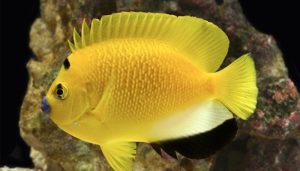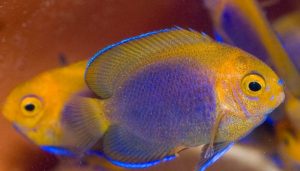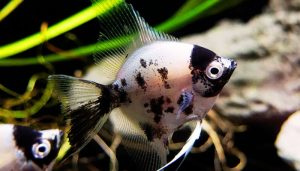Are you thinking about bringing guppies into your home aquarium? If so, you may find yourself wondering how often do guppies have babies.
After all, it’s essential to consider the size of your guppy tank and whether or not you are prepared for a regular influx of new little swimmers before committing to any pet aquaculture project!
But don’t worry; we’ll help you navigate this popular aquarium fish tricky question. Do guppies have babies often?
This blog post will explain everything about guppy breeding cycles, from identifying pregnant fish and determining appropriate fish tank sizes for large clans to preparing for successful births and adequately caring for baby guppies after they arrive.
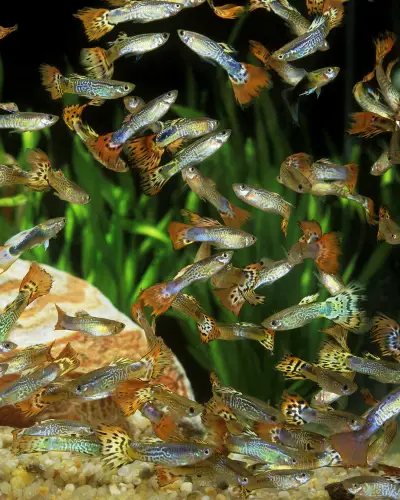
Read on as we dive deep into answering the age-old query: how often do guppies breed?
Table of Contents
ToggleWill Guppies Breed in a Community Tank?
Yes, it is possible to breed guppies in a community tank, but due to the nature of such tanks, there is no guarantee of success. It can be difficult for a breeder to control conditions within a community fish tank.
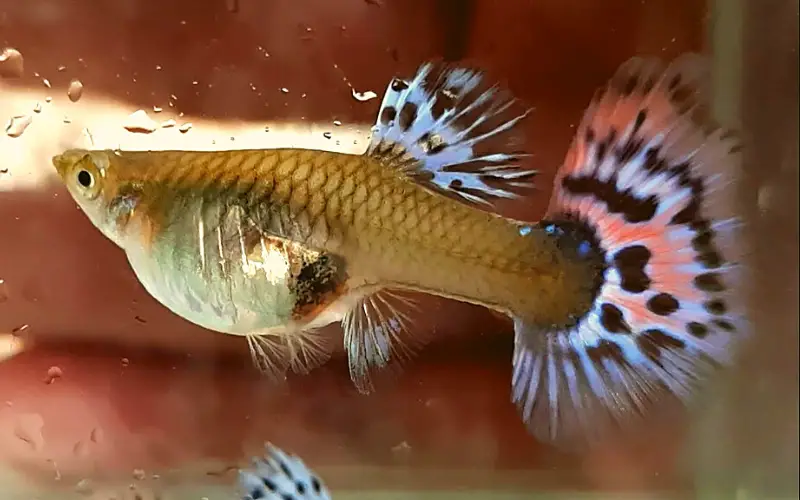
Furthermore, the presence of other fish species often leads to high competition for resources, which may put any breeding efforts at risk. As such, setting up a separate breeding tank more suited for the task is recommended if you intend to breed guppies successfully.
Do Guppies Have Live Babies or Eggs?
Do guppies give live birth? Yes, guppies are Livebearers fish species, and give birth to live young instead of laying eggs. The fertilized eggs develop inside the female’s body until they are ready to hatch as free-swimming guppy fry.
Female guppies typically have between 20 and 400 babies simultaneously, depending on their size and health. Once born, the newborns will school together and feed on algae before reaching maturity after 8-12 months of age.
How Often Do Guppies Have Babies?
How often do guppies breed? Guppies generally give birth to litters of baby guppies every 30 days. Depending on age and health, a single female guppy fish can give birth to a litter of offspring roughly 20 times through her lifetime.
Because of their short gestation period and the large number of offspring they can produce in a single birth, guppies are considered highly successful guppy breeders.
What Can I Do To Ensure Successful Breeding?
There are several steps you must take before attempting to raise guppies. To ensure successful breeding,
- First, you should make sure the water in your fish tank is clean and at an appropriate temperature for guppies to thrive (78-82 degrees Fahrenheit).
- You should also select healthy and compatible breeds of guppies to introduce into the tank so they can reproduce quickly.
- Finally, providing plenty of covers and hiding places in the tank for guppies to breed comfortably is essential. This can be achieved by adding different vegetation types such as java moss or water lettuce, plastic plants, driftwood pieces, rocks, and caves.
Taking these steps will give your guppies the best possible chance at successful reproduction.
Types of Guppies
Guppies are small tropical Fish of the Poecilidae. This fish can be categorized as “rainbowfish” and Million fish. Approximately 300 guppies live worldwide. Though the animals can usually be used as pets, they are often seen also at tropical locations. A number are commonly encountered:
Veiltail guppies are the most common type and have a large, long tail that streams down from their bodies like a veil.
- Plakat guppies have short tails and often display more vibrant colors than Veiltails. These fish tend to be hardier and can better handle cooler temperatures.
- Lyretail guppies have tails that are split in two and fan out like a lyre.
- Spade-tail guppies have short, triangular tails that spread outward from the body.
- Guppy snakes (homeopathic hybrids) are a more recent type of guppy with patterns that resemble snakes.
Knowing the type of guppy, you have can help you better understand its needs and behavior and how quickly it will breed and produce offspring.
Do Guppies Breed Easily?
Yes, guppy fish breed very quickly! They’re incredibly fast at breeding and can produce up to 100 offspring in one spawn. Because of this, they are often referred to as “million fish.”
In addition, guppy fry (baby fish) are much more resilient than many fish and have no trouble adapting to the water conditions. These factors make them an excellent choice for beginner and experienced aquarium enthusiasts!
How Long Does It Take for Guppies to Mate?
When you place male and female Guppies in a breeding tank, the female usually becomes pregnant within 24 hours. However, it may take up to 3 days if the male guppy has never bred.
The process is typically fast but may occur multiple times to ensure successful impregnation of the female. Male Guppies are territorial and will often fight with each other while trying to mate with the female.
How Quickly Do Guppies Reproduce?
How easily do guppies breed? After their first breeding session, Guppies can reproduce every 30 days. This is because of their short gestation period and the female’s ability to store sperm for extended periods.
As a result, a single female guppy can produce hundreds of offspring in one year due to continual mating opportunities. Furthermore, the batch of fry that each clutch holds can range from ten to up to four hundred!
How to Identify A Pregnant Guppy?
When the guppy is at your aquarium, you should know whose pythons have gotten pregnant to help them. It is possible to look for these pregnant females signs. They are indicated:
- Enlarged abdomen
- Slight color changes in the stomach area
- Change of behavior, like becoming more inactive or seeking shelter
- Increase in appetite
If you see a guppy exhibiting these pregnant guppy signs, it is safe to assume the fish is pregnant.
How Long Is a Guppy Pregnant For?
How long do guppies take to give birth? The gestation period of a guppy is typically 21–30 days, although some pregnancies can last up to 45 days.
While female guppies often begin to show signs of pregnancy within two weeks, the female will still not give birth until after the entire gestation period has passed.
After the pregnant female guppy has given birth, she will usually be ready for another mating session within three to four weeks. This short gestation period is why guppies are such prolific breeders and can produce hundreds of offspring in one year.
Do Guppies Give Birth All at Once?
Guppy Birth: One at a Time or All at Once? When giving birth, guppies usually deliver their offspring one by one. However, there may be intervals between groups of babies.
Do guppies have their babies all at once? These newborn guppies arrive curled into small balls, as they had matured in the female guppy womb in this unique shape. These newborns will move and swim around as soon as they enter the water.
Guppies are amazing creatures and can be great additions to any aquarium if given the right environment and care. Knowing more about them, such as their breeding habits and behavior, can help ensure your pet fish is healthy and happy.
How Many Babies Do Guppies Have at Once?
A female guppy can give birth to between 50-60 young ones at one time and reach 200 baby fries. The exact number of baby fry produced in a single spawning event depends on the size, age, and health of the pregnant female guppy.
Generally, larger or older females will produce more fry, while smaller or younger females may produce fewer. Additionally, environmental factors such as water temperature and food availability can influence the number of fries produced.
Pregnant Female Guppies Care
In pregnancy, a female guppy might start to grow bigger. Another great way to tell if a guppy is pregnant is to look underneath the tail, causing black spots to form as the baby grows.
You may see the fish lose its color, and you can see changes in behavior, e.g., becoming aggressive, swimming around the heater, or eating less of anything like before.
A Guppy’s gestation is a little over a month long. During this time, your baby’s health needs to be updated. The fish’s diet changes throughout their pregnancy, and they will no longer eat.
Guppy Diet and Predators
Guppies are omnivores and consume all kinds of plants and animals. They eat algae, plant particles, parasitic insects, and shrimp in their environment. Guppies can feed themselves fish flakes, vegetable granules, and meat bits.
Guppies should be fed wholesome food with many nutrients to help keep the baby happy. Guppies are tiny and preyed on by several other creatures, so they must learn to rely on their natural hiding spots and stay out of sight.
A pregnant guppy will become more aggressive to protect itself and its fry. It is essential to be aware of the signs that a guppy is pregnant so that you can ensure they are given the appropriate care.
When To Separate Pregnant Guppies?
Before a baby arrives, the pregnant guppy must be separated by another fish. The baby usually gives birth three to four months after conception, but it’s impossible to tell precisely how. Also, be careful about these signals that your guppy is about to be born.
After birth, the mother should be separated in the breeding box from other guppies to ensure that her fry can survive without being eaten. Otherwise, they could be consumed by the other fish in the aquarium. It is also essential to watch the mother, as she may become stressed or ill due to the labor.
It is also essential to provide the new mother with plenty of hiding spots and places to rest when pregnant guppies are giving birth, as this will help her to stay safe and healthy in their separate tank.
How Many Babies Does a Guppy Have the First Time?
The number of fries produced in a guppy’s first spawning can vary greatly. Generally speaking, younger and smaller females may produce fewer offspring than larger and older females.
The exact number of fry produced by a guppy in its first spawning will depend on the size, age, and health of the female guppy.
Adult female guppies can have 10 to 50 babies in a single spawn! Most female guppies will have between 30 and 50 young at a time.
Guppy gestation is typically 28-30 days, but it can vary depending on the fish’s temperature and age. Some younger females may take only two weeks to finish their pregnancies, while older females may take up to six weeks.
Do Baby Guppies Need Plants?
When guppies need plants that mimic their natural environments in the fish tank, add interest, or provide oxygen, baby guppies also need these plants. Baby guppies prefer mossed plants with lots of leaves, allowing them to hide in their cage and avoid catching fish.
Tips for Avoiding Predation:
Guppies can quickly breed in a community tank, but some fish disappear in a day. Many fish are happily eating their babies.
The best way to avoid predation when breeding guppies is by providing them with plenty of hiding places and adequate oxygen. Ensure the water temperature is between 72-77°F, which will help foster reproduction and provide an environment where guppies can survive.
Breeders should also use a tank with tight-fitting tops to prevent predators from entering the aquarium. Additionally, include live plants in the aquarium as they act as natural hiding areas for your fish, helping them stay safe from predators.
Finally, keep your tank clean by regularly checking for signs of parasites and other diseases that could put your fish at risk of becoming preyed upon.
Tank Setup & Parameters
Guppies are adaptable fish without requiring a particular tank configuration. An 8-liter tank would provide the perfect place to raise gummy animals.
Guppies can be placed in a shallow aquarium or over the substrate of choice, but the lid must protect your fish. Guppies are fairly durable fish that prefer a wide range of aquatic parameters:
Feeding Your Guppy Fry
Guppies can’t be good parents! Baby guppies will love to eat Baby brine shrimp twice a day. The babies feed on powdered flakes in addition to foraging with microorganisms growing from plants.
Older guppies can be fed live food such as bloodworms, daphnia, and brine shrimp. Frozen foods are an excellent alternative to live foods and are just as healthy. Guppies should be fed twice a day, but no more than they can consume in three minutes.
It is also essential to provide a variety of food and feeding methods to ensure your guppies have a balanced diet that meets their nutritional needs.
Guppies are very hardy fish and can easily survive in various environments. Guppies can provide years of enjoyment with the proper tank setup, adequate food supply, and care!
How Long Do Guppies Live?
On average, guppies live between two and three years. Of course, this can vary greatly depending on the living conditions.
Guppies in a healthy environment with the right temperature, pH balance, oxygen levels, and food will likely have longer lifespans than those in poor conditions or fed a poor diet.
Additionally, male guppies typically live shorter lives than females due to their more active lifestyles and larger size.
How Fast Do Guppies Grow?
Guppies grow quickly and reach their full size in as little as six months, given proper nutrition. Temperature is the most critical factor for guppy growth – the warmer the water, the faster it grows.
At 18-26 °C (64-79°F), healthy adult guppies will mature within 4 – 6 months. With good nutrition and care, your guppies should be fully grown by then!
Commonly Asked Questions About How Often Do Guppies Get Pregnant (FAQ)
Do Guppies Give Birth at Night?
Do guppies have live birth at night? Yes, most guppies usually give birth in the dark at night. This is due to instinctual behavior; their predators will be more likely to find and consume them in bright light. The darkness of night provides a safe environment for guppy mothers to bear their offspring without fear of predation.
Do Guppies Eat Their Babies?
Yes, guppies are known to eat their babies. Guppies display this instinctive behavior to survive; they consume their offspring to ensure they have enough food and resources for themselves.
How Long Is a Guppy in Labor?
A guppy’s labor can last anywhere from four to six hours. During that time, the mother guppy releases one or two fries at a time, sometimes pausing between births. The entire process can take up to 12 hours and is tiring for the female fish. After pregnant guppy has given birth, it’s essential to provide her with plenty of rest and nutrition to recover from her labor.
How to Know When Guppy Is Finished Giving Birth?
To know when a guppy is finished giving birth, look for the telltale signs that they are done. After birthing their young, guppies may appear to be resting or become less active. Additionally, you can check for any remaining fry in her gravid spot (the dark area near her abdomen) or by observing any further movements from your female fish.
How Soon Can Guppies Get Pregnant After Giving Birth?
Female guppies can become pregnant again just hours after giving birth. Guppies can have several generations of offspring within a year if provided with ample food and places to hide.
How Many Times Can a Guppy Get Pregnant in a Year?
A female guppy can get pregnant up to eight times in one year due to their ability to store sperm in their bodies after a single insemination.
Final Thoughts
So, how often do guppies give birth? In conclusion, guppies can have babies at any time, depending on their surroundings’ size and hardness. A pregnant guppy can produce up to 2000 fry in her lifetime, so if she is kept in a suitable environment with plenty of food and oxygen, she may lay eggs more frequently.
Owners must keep an eye on the health of the guppy parents because overly crowded conditions can create stress that affects reproduction rates. Providing the right environment and nutrients should be a top priority when caring for guppies so they will produce healthy fry and live longer. With proper care and attention to detail, these colorful fish can provide many hours of joy for their owners!
You might also like
- Pregnant Guppy Signs of Delivery: Get Ready for the Big Day
- How Many Babies Do Guppies Have? (Let’s Quell The Myth!)
- Can Guppies Breed with Mollies? Molly Guppy Hybrid (Solved)
- How Many Guppies Should Be Kept Together? (Solved)
- Can I Put 2 Pregnant Guppies Together Safely? (Solved)
- What Temperature Do Guppies Need: 5 Tips for Optimal Growth
- How Long Does It Take for a Guppy to Finish Giving Birth: (Solved)


